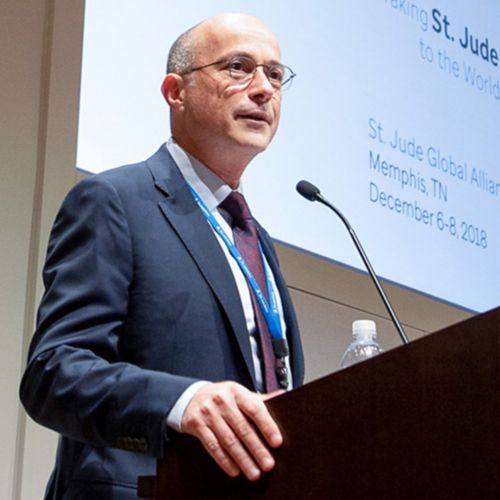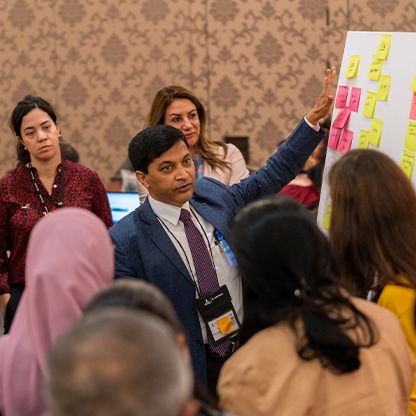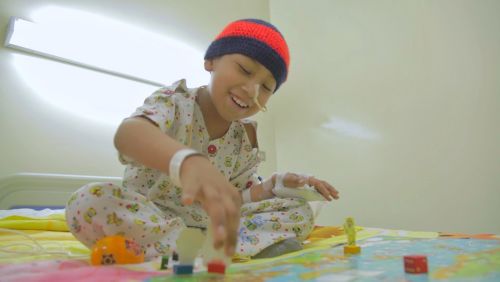St. Jude Family of Websites
Explore our cutting edge research, world-class patient care, career opportunities and more.
St. Jude Children's Research Hospital Home

- Fundraising
St. Jude Family of Websites
Explore our cutting edge research, world-class patient care, career opportunities and more.
St. Jude Children's Research Hospital Home

- Fundraising
Global Scholar: Rehana Punjwani_
Other Global Scholars Projects:
Rehana Punjwani acknowledges that, initially, nursing probably wasn’t her first choice in careers.
It was her parents who encouraged her to pursue the profession, in large part because she had aunts on both sides of the family who were nurses themselves.
But she always did love working with children, and when she entered the field in Pakistan more than 25 years ago, it revealed something new about the kids she cared for — something that sparked a passion and solidified her path.
“It’s their resilience,” she says. “I learn a lot from them. They are amazing creatures of God. You don’t see adults smiling when they have a fever. But kids — they laugh, they play. Whenever they feel better, they’re smiling, and they will approach you with love.”
That strength and spirit became an inspiration to Punjwani — and in the years that followed, she would become an inspiration herself, with her own resilience, both personally and professionally.
For one thing, Punjwani is a two-time cancer survivor. It’s an experience that has colored her approach, both as a nurse and, now, as additional director nursing at Dow University of Health Sciences.

“I want to create a sensitivity, an understanding, an educational plan, as well as a system in a hospital emergency department … that these patients don’t get delayed." — Rehana Punjwani
“I always tell people to bring a smile,” she says. “Be empathetic. It’s difficult times. You have to be really, really understanding and empathetic.” In following this approach, Punjwani has drawn from her own journey to help patients understand what to expect and what will help.
“When I was diagnosed and I went through chemotherapy and radiation therapy and surgery, I really felt more close [with my patients],” she says. “Because I thought that now I understand in a much better way what they go through. Like, what they see when they get chemo, how does it affect your body, what is the metallic taste in your mouth, what is radiation. …
“It does make you more sensitive, more empathetic, and more passionate.”
That passion, like her resilience, has been another hallmark of Punjwani’s professional journey. She entered the field at a time when there weren’t a lot of specialty training opportunities for pediatric oncology nurses in Pakistan. “Nobody was there to teach me,” she says. “There were no books, no learning resources for pediatric oncology nursing. No mentors for nurses.”
Still, she found a way. She would read the medical books for physicians that she found in her unit. She would sit in on educational sessions. “I used to sit with physicians whenever they had time and ask them, ‘Do I understand it correctly?’ And then I went back and started relating it with my nursing profession, and understood the role that, this is where I should work on.”
Determined to help the nurses that would come after her, she established training programs — programs that have now helped train more than 350 nurses. And in 2009, with the support of colleagues and a My Child Matters grant from the Sanofi Espoir Foundation, she helped found the first pediatric oncology nursing department in Pakistan.
“To fulfill that mentor role that I did miss … it’s something that is very rewarding, very fulfilling,” she says. “At least these people have somebody they can text, message, call, or ask even, ‘Is this right? Am I doing this right? Is this correct? Are we supposed to do this?’ ”
In recognition of her work training pediatric oncology nurses, Punjwani was honored in 2021 with a Nursing Leadership Award by the International Society of Paediatric Oncology (SIOP). A year later, she became the first nurse to graduate from the Global Scholars Program, where she focused her Scholars Project on another step she hopes can make a critical difference: improving the antibiotic administration time for pediatric oncology patients with febrile neutropenia.
Punjwani’s project grew from her own experience and research, as well as what she learned in conferences, workshops, and seminars. Time and again, these showed her the importance of capitalizing on the “golden hour” for pediatric cancer patients with complications — that is, getting antibiotic treatment to these patients within 60 minutes of their arrival at a hospital.
“[To] develop a device, tools, algorithms, and standards in a hospital by empowering nurses is something that I really think is instrumental in low- and middle-income countries, where resources are scarce,” she says.
“I want to create a sensitivity, an understanding, an educational plan, as well as a system in a hospital emergency department … that these patients don’t get delayed.”
As she talked about her project and reflected on her time in the Global Scholars Program, Punjwani said she felt a responsibility to take what she has learned — about leadership, health policies, organization thinking, and improvement cycles — and share it with others.
It is one more example of her lifting up others in the profession. And looking back, the resilience she saw in her patients helped accelerate her love for nursing, but so too did this opportunity she saw in front of her.
“I can do so much in here,” she remembers thinking. “Somebody who’s as optimistic and enthusiastic as me sees an opportunity that there’s a lot to be done. So I saw that opportunity that people really need to empower nurses, to uplift the nursing profession and to give it, as a career, a respect it deserves — in Pakistan and in low- and middle-income countries.
“That is something that I’m really very passionate about.”


